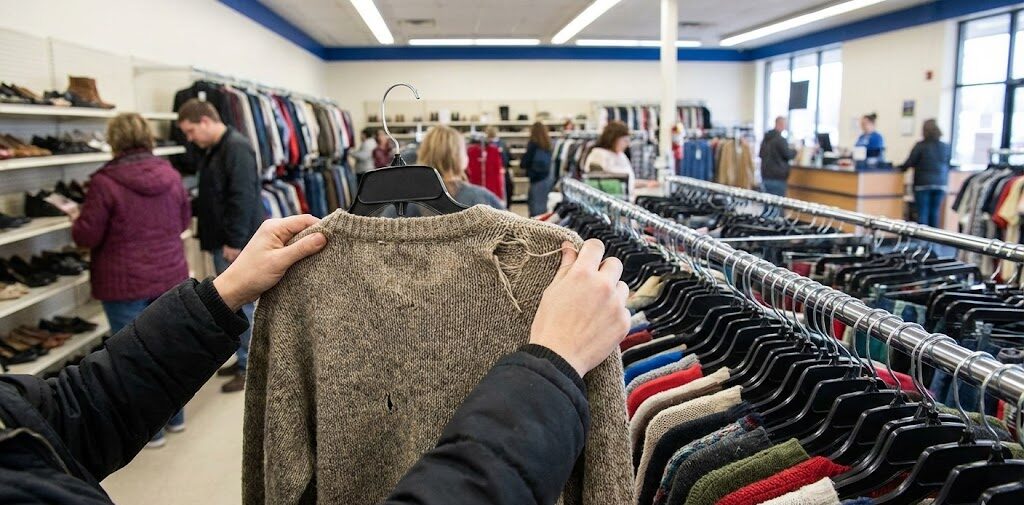
Thrift stores provide veterans with a pathway to civilian careers by offering hands-on training, mentorship, and growth opportunities. These programs help veterans translate their military skills into workplace expertise while fostering community connections. Key takeaways:
- Training Programs: Veterans gain retail skills like inventory management and customer service in a structured, supportive environment.
- Mentorship: One-on-one guidance helps veterans adapt to civilian work culture and develop leadership abilities.
- Career Advancement: Clear pathways to management roles and benefits like health insurance and tuition assistance ensure long-term job stability.
- Community Impact: Proceeds from thrift store sales fund veteran-focused initiatives, benefiting local economies and families.
Veteran-focused thrift stores, such as Red Racks in Missouri, exemplify how these programs can transform lives while strengthening communities.
Training and Skill Development Programs for Veterans
Thrift stores offer structured programs designed to help veterans transition their military expertise into valuable workplace skills. These initiatives go beyond standard job training, equipping veterans with tools to thrive in civilian careers through hands-on experience.
Hands-On Training in Daily Operations
Veterans participating in thrift store training programs dive straight into the world of retail. They take on tasks like UPC scanning, item entry, inventory control, and stock management. Starting with foundational duties – keeping the store clean, assisting with merchandising, and welcoming customers – they gradually move on to more advanced responsibilities. Research highlights that well-trained retail teams often see improved sales, higher profitability, and reduced onboarding time.
Training is broken into smaller, manageable steps to ensure veterans build confidence. For instance, activities like organizing merchandise by color and size not only familiarize them with the store layout but also enhance their presentation skills.
The program also introduces veterans to key retail concepts, including consignment basics, pricing systems, customer service protocols, and store navigation. Pairing new hires with experienced staff ensures that learning is practical and feedback is immediate.
“You have to give them a chance to do what you taught in a safe environment without the pressure of making the sale.” – Bob Phibbs, The Retail Doctor and SalesRX
This hands-on approach naturally helps veterans develop critical communication and leadership skills.
Developing Communication and Leadership Skills
While technical training is essential, these programs also focus heavily on soft skills like communication, teamwork, and leadership – qualities that are crucial for career growth. Drawing from their military backgrounds, veterans quickly adapt to these dynamic roles. Training sessions are intentionally concise, lasting between 15 minutes and one hour, to ensure focus and better retention.
Role-playing exercises are a key component, preparing veterans for everyday customer interactions as well as more challenging situations. These exercises sharpen problem-solving abilities, empathy, and time management. Veterans are also trained to juggle multiple responsibilities, such as assisting shoppers while managing consignor relationships and inventory, reflecting the complex environments they navigated during military service.
Here’s a breakdown of the training focus areas and the skills they help develop:
| Training Focus | Key Skills Developed |
|---|---|
| Customer Interactions | Communication, product expertise, conflict resolution |
| Consignment Management | Attention to detail, negotiation, and policy explanation |
| Inventory Operations | Organization, accuracy, system navigation |
| Team Collaboration | Leadership, mentoring, and workplace communication |
As veterans advance through the program, they often step into mentoring roles for newer employees. Their military experience becomes an asset, guiding others and fostering a collaborative environment. This approach reflects a simple yet profound truth:
“We can hire nice people and teach them to sell, but we can’t hire salespeople and teach them to be nice.” – Bruce Nordstrom
Red Racks Thrift Stores leverages veterans’ discipline and teamwork to help them master retail skills and prepare for long-term success.
Mentorship and Support Programs for Veterans
Thrift stores go beyond technical training by offering mentorship programs aimed at helping veterans transition smoothly from military to civilian workplaces. These initiatives not only leverage veterans’ existing skills but also guide adapting to civilian work cultures.
One-on-One Mentorship for Career Development
Mentorship programs are a cornerstone of this support system, offering personalized guidance to veterans. Many thrift stores establish formal mentorship initiatives where experienced staff or managers work closely with veteran employees. These partnerships focus on translating military experience into civilian job skills while boosting confidence in new roles. Mentors and mentees are carefully paired to ensure compatibility, creating a supportive relationship that addresses individual needs.
Research underscores the importance of mentorship during this transition. A Syracuse University study highlights that veterans often change jobs multiple times early in their civilian careers. Additionally, the Department of Veterans Affairs identifies mentorship as a critical tool for easing this adjustment. Through these programs, veterans are guided into suitable roles – whether in customer service, management, or other areas – while also learning to navigate workplace dynamics.
Organizations like Red Racks Thrift Stores actively support these mentorship efforts. They connect new veteran employees with seasoned team members who provide not only professional advice but also emotional support. These one-on-one relationships often serve as the foundation for broader peer support networks within the workplace.
Veteran Support Networks in the Workplace
Thrift stores also focus on fostering veteran support networks within their teams. These networks bring together employees with shared military experiences, creating spaces for camaraderie and mutual understanding. Over time, veterans who have successfully transitioned into civilian roles often take on mentorship roles themselves, establishing a cycle of support that strengthens the organization.
Participation in these networks is voluntary, allowing veterans to engage at their own pace while building connections with colleagues. This approach helps create a workplace culture where veterans feel valued for their unique experiences and perspectives. According to studies, mentoring programs can reduce employee turnover by an average of 50%, leading to stronger team cohesion and lower hiring costs.
These support networks also provide practical benefits for daily operations. Veterans often share strategies for managing customer interactions, handling stress during peak times, and juggling multiple responsibilities. Their military background in teamwork and problem-solving becomes a resource for the entire staff. These networks also reinforce lessons from formal mentorship programs, contributing to career growth and workplace satisfaction.
“Volunteers of America just made it all happen, but more importantly, for the first time in 20 years, I felt that camaraderie – like I was back in the military. And I keep coming back because they’re like my family.” – Karen, a Military Veteran & Moral Injury Participant
Career Growth and Advancement Opportunities
Thrift stores go beyond training and mentorship by offering veterans clear paths for career progression. These pathways are designed to help veterans move from entry-level roles into leadership positions. This structured approach to advancement plays a critical role in ensuring job satisfaction and stability as veterans make the transition from military service to civilian employment.
Promotion to Management and Leadership Positions
Veterans often bring a unique combination of discipline and problem-solving skills that make them strong candidates for promotions. Starting as sales associates or donation processors, they can advance to roles like team lead, assistant manager, and eventually store manager. Many thrift stores focus on fostering a supportive and collaborative work environment, which helps employees feel empowered and engaged while reaching their full potential.
Veterans’ experience in logistics and supply chain management can be particularly valuable in these roles. They can apply their expertise to improve inventory systems and streamline donation processes, making operations more efficient. Advancement often depends on consistently demonstrating leadership skills and maintaining a strong work ethic. Participation in training programs and mentorship opportunities can further accelerate this upward trajectory, offering veterans not just recognition but a fulfilling and secure career path.
Employee Benefits and Job Security
Retaining veterans often comes down to offering competitive pay and strong benefits, as insufficient compensation is a common reason veterans leave their first civilian job. Thrift stores address this by providing benefits packages that promote financial stability and reward performance.
Health insurance, retirement plans, and paid time off are some of the standard benefits offered. For example, Red Racks Thrift Stores – a veteran-owned organization in Missouri – tailors its employment opportunities to meet the specific needs of veterans. They focus on providing stable jobs, competitive salaries, and room for growth.
Additionally, many thrift stores support continuing education through tuition assistance or flexible schedules, allowing veterans to build new skills that pave the way for future career advancements. This combination of benefits and development opportunities creates a solid foundation for veterans to thrive in their post-military careers.
Community Benefits of Veteran Employment Programs
When thrift stores employ veterans, the ripple effects strengthen communities, boost local economies, and help veterans rediscover a sense of purpose.
Helping Veterans Find Purpose and Community Connection
Thrift stores provide veterans with more than just jobs – they offer a renewed sense of purpose and a way to reconnect with their communities. By working alongside other veterans and residents, they help bridge the gap between military and civilian life.
Take the example of Down the Road Thrift in Cocoa, Florida. In 2017, this thrift store partnered with the HUD-VASH program to provide homeless veterans with free furniture and home essentials, turning empty apartments into welcoming homes.
Organizations like AMVETS have spent over 75 years honoring veterans’ service and sacrifices. Their thrift stores not only employ veterans but also create an environment of camaraderie and support. According to the U.S. Department of Labor, veterans bring a wealth of qualities to the workplace, including leadership skills, adaptability, a strong work ethic, and problem-solving abilities.
Red Racks Thrift Stores, a veteran-owned operation in Missouri, embodies this mission. These stores connect veterans to their local communities while supporting Disabled American Veterans. Beyond offering employment, they serve as spaces where veterans can achieve personal and professional growth while fostering a sense of belonging.
This combination of purpose and connection doesn’t just benefit veterans – it also drives local economic growth, as explored below.
Supporting Local Economic Growth
Veteran employment in thrift stores not only transforms lives; it also fuels local economies. These businesses operate on a model that prioritizes community impact through donations, sales, and reinvestment in local initiatives.
The financial contributions are impressive. One thrift shop alone donated over $115,000 in scholarships and community programs, directly supporting soldiers’ families and local schools. Donna Woodham, manager of the Thrift Shop on Fort Rucker, described how donations fuel this impact:
“The Thrift Shop relies on donations [of items] to sell in order to generate maximum profit. That allows us to grant scholarships and make financial contributions to organizations in the community.”
In addition to donations, these shops offer consignment services, returning 70% of sales directly to residents. This keeps money circulating within the community, creating a self-sustaining cycle where everyone benefits.
AMVETS highlights this reinvestment approach clearly. As they explain: “Our Thrift Stores offer the general public household goods and clothing at discounted prices. The proceeds from our store sales allow us to provide programs that benefit our veterans”. These proceeds fund a range of initiatives, including healthcare, housing assistance, education, and job training.
Thrift stores also make essential goods affordable for everyone, ensuring that even those with limited resources can access what they need. This affordability strengthens local economies by keeping spending power within the community while supporting charitable efforts.
Through these combined efforts, veteran employment programs in thrift stores create meaningful, lasting benefits that ripple across entire communities.
Supporting Veterans Through Thrift Store Career Programs
Thrift stores have become vital resources for helping veterans transition into civilian careers, offering opportunities that not only change individual lives but also uplift entire communities. These programs provide tailored support systems designed to meet the unique challenges veterans face, making a lasting impact on their path to long-term career success. Red Racks Thrift Stores stand out as a shining example of this mission in action.
Operating across Missouri, Red Racks Thrift Stores are veteran-owned and committed to supporting Disabled American Veterans. They provide meaningful career opportunities that include benefits and room for growth, creating workplaces where veterans can rebuild their professional lives while giving back to their communities. Each veteran receives personalized guidance, ensuring their career goals align with their unique skills and experiences.
The benefits extend far beyond individual careers. By supporting Red Racks Thrift Stores, communities contribute to local economic growth, foster social connections, and promote environmental responsibility. These stores also channel resources into programs that assist soldiers’ families and local schools, keeping funds circulating within the community and creating a ripple effect of positive change.
You can make a difference. Whether you shop, donate, or explore career opportunities at Red Racks Thrift Stores, you’re directly supporting veteran-focused programs that honor military service and strengthen your community. Veterans interested in these services can connect with career advisors for help with resumes, job searches, and interview preparation. Every purchase and donation helps build a brighter future for veterans and the communities they serve.
FAQs
How do thrift stores help veterans build skills and transition to civilian careers?
Thrift stores play an important role in helping veterans transition from military life to civilian careers. Many of these stores go beyond just offering jobs – they provide training programs focused on building skills, mentorship, and career development. Veterans can gain practical experience in areas like customer service, inventory management, and leadership, all of which are valuable across various industries.
Some thrift stores, particularly those run by veteran-owned organizations, also offer mentorship programs and access to resources tailored to veterans. These initiatives aim to guide veterans through the job market, equipping them with the tools and confidence they need to thrive in their new career paths. At the same time, they create a sense of community and support, making the transition smoother and more encouraging.
How do thrift stores help veterans grow their careers through mentorship and skill-building programs?
Thrift stores contribute significantly to veterans’ career development by offering programs that focus on mentorship and skill-building, designed specifically for their needs. These initiatives help veterans adapt their military experience into practical skills for civilian jobs, providing tailored guidance and boosting their confidence as they transition into the workforce.
Mentorship programs are a key component, pairing veterans with seasoned professionals who provide career advice, leadership training, and emotional support. Through hands-on activities and active community engagement, veterans acquire new skills, explore different career opportunities, and establish a strong support network – tools that are invaluable for their career growth and personal progress.
How do thrift stores help veterans build careers while benefiting the local community?
Thrift stores play an important role in helping veterans by providing career training, mentorship programs, and job opportunities that equip them with practical skills and a path toward financial independence. These programs often emphasize areas like customer service, inventory management, and leadership, giving veterans the tools they need to grow in their professional lives.
Beyond career development, thrift stores make a meaningful impact on their local communities. They offer affordable shopping options, encourage sustainability by promoting the reuse of donated items, and create employment opportunities. Take Red Racks Thrift Stores, for instance – a veteran-owned organization that not only invests in initiatives supporting veterans and their families but also contributes to the wider community through recycling efforts and charitable donations.





